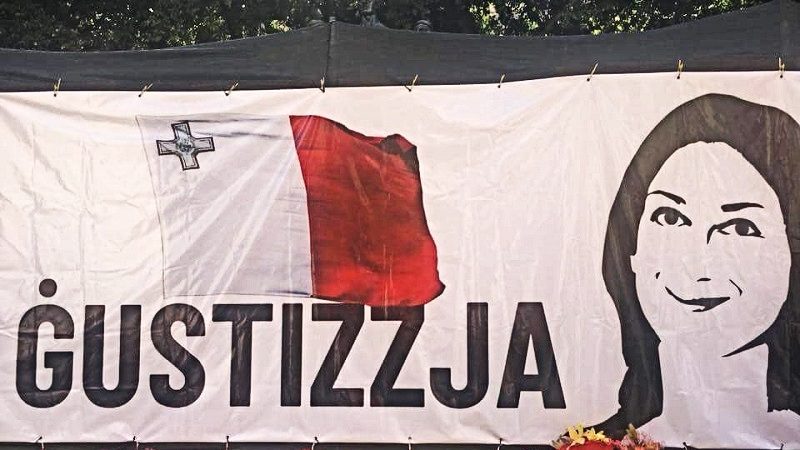I was discussing the situation in Malta with a bemused Irish friend – running him through the corruption, the cronyism, and the fascism – and explaining to him that most of it all was revealed by one particularly brave independent journalist called Daphne Caruana Galizia, who was assassinated in a car bomb on this day, 11 months ago.
He immediately sought to draw a parallel with Ireland’s own intrepid Veronica Guerin – assassinated in 1996 for exposing money laundering and drug dealing in Dublin.
I needed to check him on that. Yes they were two fiercely opinionated, courageous investigative journalists, yes they were both cruelly taken from their families, friends, and countrymen and killed in their cars, and yes they were tellingly both women – but the two cases differ in one major respect: the appreciation they garnered both in life and after death.
When Guerin was shot five times in her car by powerful people who wanted her silenced, the Irish responded with deep sorrow and outrage. Admirers lined up in front of the offices of The Sunday Independent to leave flowers and sign a condolence book.
The Labour unions across Ireland called for a moment of silence in her memory on 4 July and people on public transport, in stores or on the street, sat or stood quietly with their heads bowed in tribute.
The Garda crackdown that followed Guerin’s death showed gangsters that they were not untouchable. Numerous arrests and the seizure of €50m of assets and €150m in taxes followed that brutal killing.
When Caruana Galizia’s car was blown up so violently 11 months ago today, members of the once-secret pro-Muscat online Facebook groups celebrated her assassination.
Some police officers publicly relished the moment, suggesting that she had got what she deserved – and were upvoted by plenty on Facebook. Valletta 2018 chairman Jason Micallef mocked her last words and Justice and Culture Minister Owen Bonnici defended him, and Labour MP Rosianne Cutajar spoke of Caruana Galizia’s “seeds of hate” in Parliament on the day marking four months since her death… and these are just a couple of examples.
As suspicion quickly landed on the government – Caruana Galizia’s prime target – one of the lines of defence used was to suggest that her own family was somehow responsible for her death. Banners put up by activists asking the difficult questions have been quickly and pointedly removed. Activists have had to guard the banner put up at the Great Siege monument overnight, so a vigil can be held in her memory on Sunday, on the day she was killed 11 months ago.
While Veronica was celebrated with a statue located in the grounds of Dublin Castle, the Maltese government is actively suppressing freedom of expression and freedom of assembly by blocking off a public monument under false pretences.
“So the Maltese would sooner align themselves with murderers and money launderers than they would journalists?” asks my friend aghast. The short answer is: Yes.
“Why?”
Well, there’s raft of reasons, but one element is particularly troubling in Malta: the misogyny.
There’s a common misconception in Malta that men have a monopoly on misogyny, yet the most insidious effect misogyny has had has been to convince women of their own worthlessness, and that of their sisters.
Over the centuries it has permeated every day discourse, culture and institutions, such that you now have women who – wittingly or otherwise – assume the role of ‘double agents’, masquerading as empowered women who are actually proponents of an androcentric point of view.
While the Labour Party has been at the forefront of legislation that theoretically levels the playground for women in society, its behaviour and ethos betray its atavism.
Throughout Caruana Galizia’s life the Party wielded its media house as a tool to alienate her, and some of the most virulent contributors to her dehumanisation have been women.
It’s not that the Labour party hasn’t turned a blind eye to violence towards male critics – after all there have been calls for the hanging of PN MEP David Casa and death threats levelled at PN MP Simon Busuttil – however the sustained attack on one woman becomes all the more abhorrent with the collusion of other women.
What makes it all the more abysmal is the hypocrisy. Even as Labour MEP Miriam Dalli penned a piece about how Labour women have been the victims of classism and misogyny, she remained silent as Tony Zarb called female activists for Occupy Justice “prostitutes”.
Even while Rosianne Cutajar cries “misogyny” whenever a criticism is levelled at her by a man, she is still a member of hate groups that targeted Caruana Galizia as a woman first and foremost. Labour MEP Marlene Mizzi and Nikita Zammit Alamango, who last month took over responsibility of Labour’s women group, Nisa Laburisti, kept schtum.
Caruana Galizia’s death put an end to the notion that this administration is “the most feminist or progressive government”. And every time that banner is taken down, every time those flowers and candles are removed, it is a reminder of the need to defend our freedoms.
The call for justice will not be silenced.
A vigil will be held at the Great Siege monument on Sunday 16 September at 7pm to mark 11 months since Daphne Caruana Galizia was assassinated.












